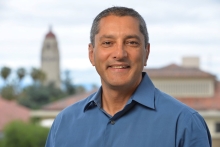CBE Seminar (Zoom): CRISPR-based Diagnostics - Fundamental Kinetics and Microfluidic Assays

Stanford University
Non-UCI people, please use this registration link: https://forms.gle/rT8QLJrWbZqFjtat9
Abstract: Molecular diagnostics based on clustered regularly interspaced short palindromic repeats (CRISPR) enzyme systems have been the subject of intense research and rapid development in the last several years. CRISPR-associated (Cas) enzyme assays are easily reconfigurable to different nucleic acid targets and highly specific. Despite this potential, the limits of detection (LoDs) and possible applications of CRISPR-based diagnostics remain an open question. We discovered that the great majority of all CRISPR enzyme kinetics studies to date show data that grossly violate basic rules of mass conservation and rate laws. Following up on this finding, we quantified the kinetics of a wide range of CRISPR-Cas systems and established fundamental relations between reaction kinetics and LoD. We also recently demonstrated the specificity of CRISPR enzymes to small mutations, including single nucleotide polymorphisms.
CRISPR-based diagnostics are a contender for point-of-care applications as they are operable at room temperature and compatible with lyophilized reagent. These diagnostics also have excellent potential for highly specific assays, including detection of single-nucleotide polymorphisms. We report on our ongoing development of microfluidics devices for highly automated assays using isotachophoresis (ITP). ITP is an electrokinetic technique that can selectively and simultaneously purify, mix and preconcentrate target species by more than 1,000 fold. We use this to accelerate CRISPR-Cas enzymatic reactions and focus post-reaction reporter molecules, including for SARS-CoV-2 detection.
Bio: Juan G. Santiago received his master's degree and doctorate in mechanical engineering from the University of Illinois at Urbana-Champaign in 1995. He holds the Charles Lee Powell Foundation endowed professorship at Stanford University and serves as vice chair of the Department of Mechanical Engineering. His research includes the development of microsystems for on-chip biochemical analysis, microfluidic cell assay systems, two-phase flow devices and capacitive deionization technologies. Applications of this work include molecular diagnostics, basic studies of cell biology, electronics cooling and the production of drinking water. He is a fellow of the American Physical Society, American Society of Mechanical Engineering, and American Institute for Medical and Biological Engineering. In 2022, he was elected to the American Academy of Arts and Sciences and to the National Academy of Inventors. He serves as the editor-in-chief of the journal Flow. His work is cited about 1,500 times per year (Google Scholar h index of 85). He has authored and co-authored over 210 archival publications and 250 conference papers, and he is a named inventor in 58 issued patents (25 of which are currently licensed).
Host: Assistant Professor Tayloria Adams
Share
Upcoming Events
-
MSE 298 Seminar: Quasi-1D/2D Charge-Density-Wave Materials - From Exotic Physics to Application Prospects
-
EECS Seminar: Steering Diffusion Models for Generative AI, From Multimodal Priors to Test-Time Scaling
-
MAE 298 SEMINAR: Hypersonic Viscous Aerothermochemistry - External Aerothermodynamics and Scramjet Fuel-Air Mixing
-
CBE 298 Seminar: Finding Catalysts of Gut Reactions - The Gut Microbiota in Disease Onset and Treatment
-
CEE Seminar: Confirming a Critical Foundation of Global Warming - Direct Observational Evidence from Space of the Impact of CO2 Growth on Infrared Spectra
